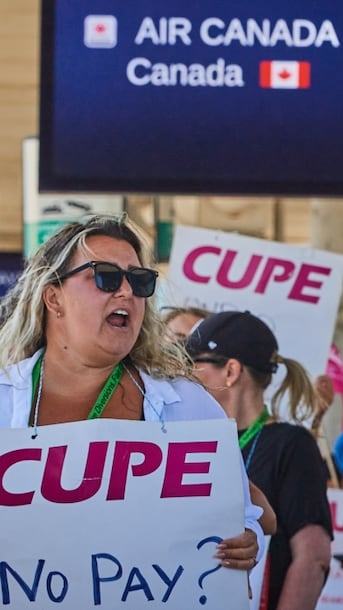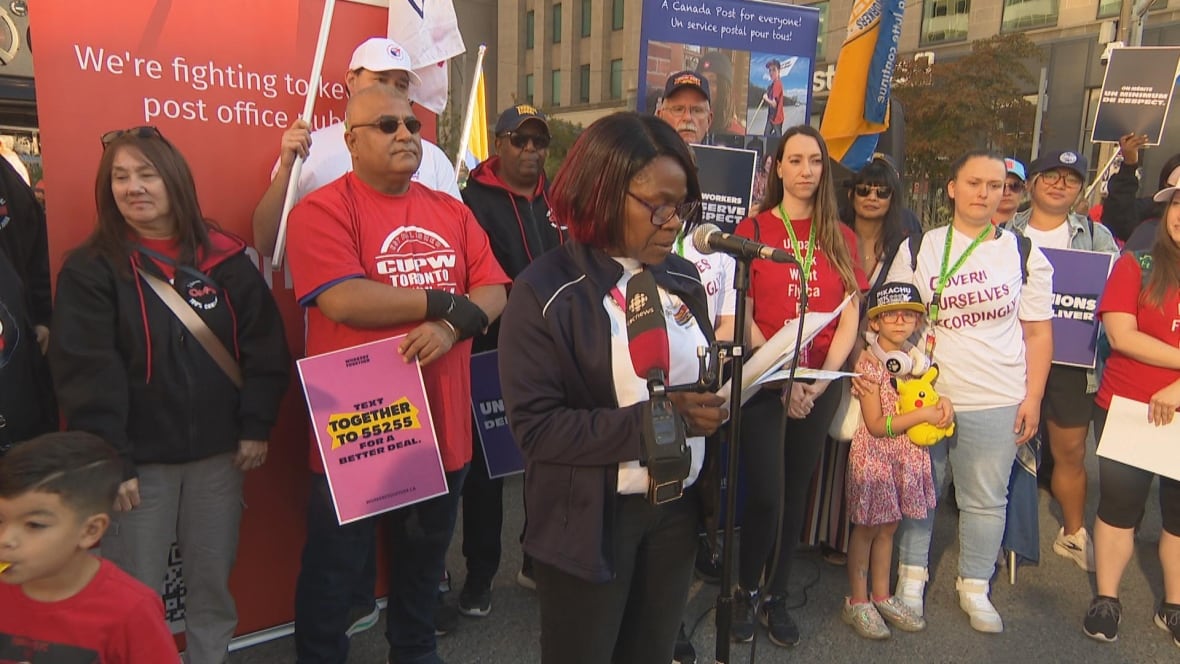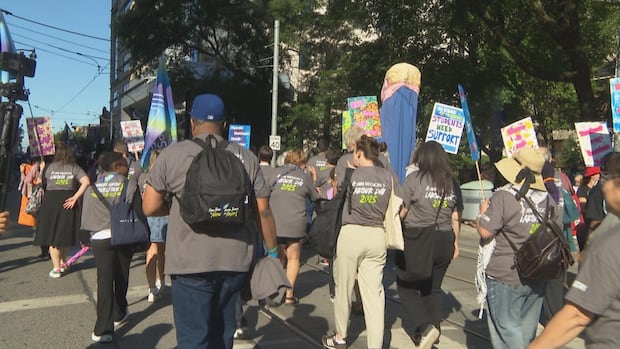Workers and union members across the GTA gathered in downtown Toronto on Monday for the annual Labour Day parade – and this year’s celebrations saw union leaders calling for a united front against all attacks on workers rights.
The theme for the annual event was “A Canada for Workers: Made Here, Paid Here.”
Labour leaders pointed to U.S. President Donald Trump’s tariffs and Prime Minster Mark Carney’s government using the Canada Labour Code to end strikes, which they say is hurting workers’ ability to bargain for better wages.
“We face unprecedented attacks, including Trump[‘s] tariffs, threats of annexation and a federal government that won’t allow workers to bargain a fair deal,” Geordie Dent, a communications and data coordinator with the Toronto and York Region Labour Council, said at the parade.
Over the last year, the federal government used Section 107 of the Canada Labour Code multiple times to end labour disputes as wages have been a major point of contention between workers and employers.
“The government has poisoned the bargaining climate and made settlements less likely, leading to more disruption and longer work stoppages,” the regional labour council said in a release issued Thursday.
WATCH | Section 107 and the Air Canada strike, explained: 
Section 107 and the Air Canada strike, explained
The federal government invoked Section 107 of the Canada Labour Code to end the Air Canada flight attendants’ strike, but workers are defying the back-to-work order. CBC’s Avneet Dhillon explains the controversial labour law.Carney puts ‘corporate friends’ first: CUPE
Most recently, the provision was used by federal jobs minister Patty Hajdu to send Air Canada employees back to work less than twelve hours after they walked off the job. Despite this action, the union that represents Air Canada workers, Canadian Union of Public Employees (CUPE), headed back to the picket lines until a tentative agreement was reached August 19.
“Workers will win – despite the best effort of the Liberal government and their corporate friends,” CUPE president Mark Hancock said in a statement that day.
Section 107 was also used to end other Canada-wide labour disputes and disruptions at Canada Post, along with ports and railways.
The union that represents Canada Post workers said this strategy by the federal government hurts the most vulnerable workers.
“Patty Hajdu is undermining collective bargaining of mostly women, racialized workers and young workers with her use of Section 107,” Jan Simpson, National President of the Canadian Union of Postal Workers (CUPW) said at the parade.
Impact of U.S. tariffs
Putting workers first is key to strengthening the Canadian economy amid the impact of U.S. tariffs, Canada’s largest private sector union which represents 320,000 workers, Unifor, said in a statement before a scheduled pre-parade rally Monday.
“We’re in the fight of our lives, and together we must stand up to Trump and build a stronger, more resilient Canadian economy,” Unifor National President Lana Payne wrote.
U.S. tariffs have led to mass layoffs in the steel industry and according to the the United Steelworkers union (USW), they show the shortcomings of the employment insurance (EI) system.
“The 55 per cent [of salary] that these members are being given by EI is not enough to support themselves or their families,” USW Toronto area council Carolyn Egan said.
 Toronto and York Region Labour Council president Andria Babbington started off the Labour Day parade with a pointed speech. (CBC News)
Toronto and York Region Labour Council president Andria Babbington started off the Labour Day parade with a pointed speech. (CBC News)
As Prime Minister Mark Carney removes retaliatory tariffs on CUSMA-compliant U.S. goods, Canadian Labour Congress (CLC) secretary-treasurer Lily Chang said at the parade that caving to U.S. tariffs is “not an option.”
“Canada must impose counter tariffs … use Canadian materials and Canadian workers,” Chang said.
“This isn’t just about defending jobs, its about protecting our economy, our communities and indeed, Canada’s future”
Carney needs to tell employers to get back to the bargaining table and face U.S. tariff threats head on, Toronto and York Region Labour Council president Andria Babbington said at the end of her speech.
“It’s time you [Carney] show America that you practice what you preach.”

